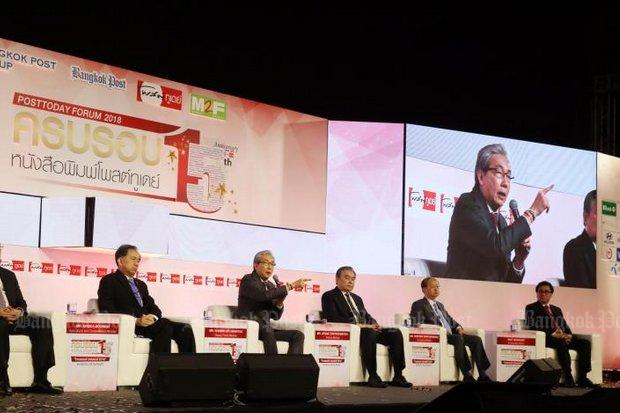Thailand – Panel: Economy firing on all cylinders
The Thai economy is proceeding at full throttle this year, propelled by four active engines: state investment, private investment, exports and household consumption, says Deputy Prime Minister Somkid Jatusripitak.
Speaking at Wednesday’s “Thailand Takeoff 2018” seminar presented by Post Today, Mr Somkid said the government’s economic reform policies are on the right track, as indicated by stronger exports and improving GDP growth over the past few years.
Thailand finished 2017 with export growth of 9.9%, the highest in six years, propelled by higher purchases from key trading partners, especially the US, the EU, Asean and China.
The country’s full-year shipments amounted to US$237 billion (7.5 trillion baht). By contrast, exports in 2016 rose by just 0.5%.
Imports in 2017 jumped 14.7% to $223 billion, giving the country a trade surplus of $13.9 billion.
Mr Somkid sounded a bullish note on continued momentum this year, predicting economic growth of more than 4% in 2018.
Last month he said the Thai economy was expected to grow by nearly 5% in the fourth quarter of 2017, leading to full-year growth of 4% in 2017 against 3.2% growth in 2016 and 2.9% growth in 2015.
“The government and state-owned enterprises’ investment, particularly in infrastructure projects, is moving at full speed this year, while private investment is forecast to soar, especially in the 10 targeted industries of the Eastern Economic Corridor scheme, with investment in the EEC estimated at 300 billion baht this year,” Mr Somkid said. “The tourism industry has also maintained its good growth this year, with foreign visitors estimated at 37 million, up from 35 million last year.”
Mr Somkid said the Commerce Ministry may need to revise up its export growth forecast of 6% this year, taking into account the improving world economy.
According to Commerce Minister Sontirat Sontijirawong, the ministry will call a Feb 21-22 joint meeting with commercial counsellors to revise the forecast.
Industry Minister Uttama Savanayana said the government has set a clear investment policy from the onset to attract foreign investment, particularly in quality projects related to 10 targeted industries.
The 10 industries are next-generation cars; smart electronics; affluent, medical and wellness tourism; agriculture and biotechnology; food; robotics for industry; logistics and aviation; biofuels and biochemicals; digital; and medical services.
Finance Minister Apisak Tantivorawong said at the seminar that this year’s loosening fiscal policy will help the Thai economy grow at a faster pace than last year. Private investment will also lend support to the economy, he said.
Thailand’s new growth engine is the Eastern Economic Corridor (EEC), which will attract both local and foreign investors and create supply chains in the country, Mr Apisak said.
Despite easing fiscal policy and massive state investment, the government has no plan to raise taxes but it does intend to expand the taxpayer base to those who still understate tax bills, he said.
In the meantime, Agriculture and Cooperatives Minister Grisada Boonrach said his ministry plans to upgrade some of the 4,000 agricultural cooperatives across the country to become a distribution channel for farm products.
The ministry will cooperate with the Commerce Ministry to seek markets for agricultural products, he said.
Boosting the income of low earners, particularly farmers, is the government’s priority this year in a bid to make the economic recovery more broad-based.
Commenting on falling rubber prices, Mr Grisada said he expected rubber prices to pick up in the future.
“The chance that rubber prices will increase is higher,” he said. “The strong point of rubber is that it can be kept for longer periods than rice, and it can be kept for 10-15 years in good storage conditions.”
Rubber has generated the biggest income for the country among crops at 200 billion baht a year over the past three to four years, surpassing rice’s 180-190 billion.
Thailand produces between 4 million and 4.5 million tonnes of rubber a year, of which 3.8 million is shipped to other countries.
Source: https://www.bangkokpost.com/news/politics/1409278/panel-economy-firing-on-all-cylinders


 English
English




